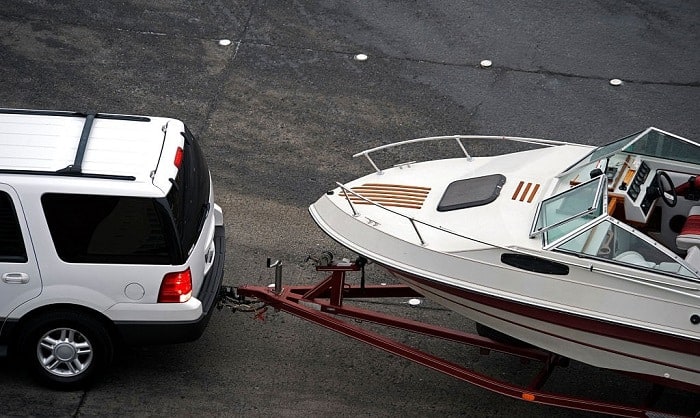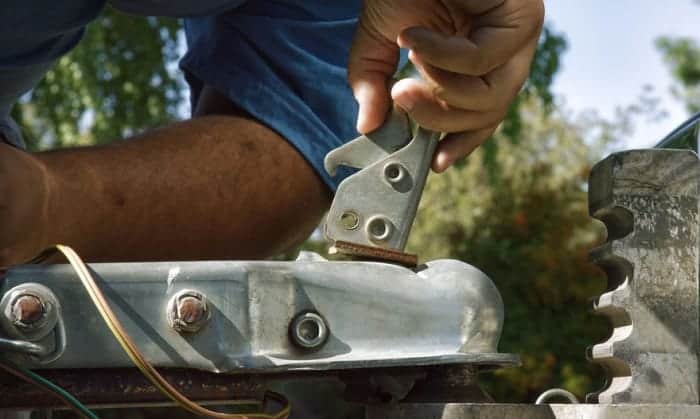Have you been thinking of these things lately? What the tongue weight of a trailer should be, what percent of the total weight of the boat? If you are, good thing you’ve found this article!
The answer to this TP-1 question is 9% to 15% of the boat’s weight. These are important digits as getting the wrong calculation can damage your boat, vehicle, trailer, or all of them at once. Excessive weight on the trailer hitch can drag the wheels. Hence, steering problems and damages follow.
Learn more about the appropriate tongue weight and other related factors to have a safe trailer for your boat.
Table of Contents
Tongue Weight For Safe Towin
The trailer’s tongue has a weight that goes downwards. It creates a force that is deployed on the hitch linked to the vehicle. When there’s inadequate tongue weight, trailer sway can happen.
Trailer sway can lift the vehicle’s end and this is a dangerous occurrence. Too much tongue weight can be harmful as well. This results in sagging of the vehicle’s back end and there are some consequences.
Therefore, negative effects on handling the vehicle, brakes, and the driver’s visibility can be experienced. Based on the recommended 9% to 15%, you need to have a 500-lb tongue weight if you’re towing a 5,000-lb trailer.
Steps On Safe Boat Trailering With The Right Tongue Weight
Your trailer should have the right load capacity to lift the boat’s weight as well as other things like a fuel tank, engine, and other equipment. Here are the right steps to take:
Step 1. Gross Weight Vehicle Rating
The rating of the gross weight vehicle should be around 85%. Be aware of it before you load it for the first time. Here’s a guideline:
- Class 1 – 2,000 pounds to GWVR – 1,700 pounds
- Class 2 – 3,500 pounds to GWVR – 2,975 pounds
- Class 3 – 5,000 pounds to GWVR – 4,250 pounds
- Class 1 – 2,000 pounds + GWVR – 85% of total pounds
GAWR or Gross Axle Weight Rating is another important thing. It’s the minimum rating of the boat trailer tires to bear the load capacity. Moreover, it can be equal to GWVR but it shouldn’t be lower.
These ratings are available on the capacity plate of your trailer. It’s usually situated on the curbside and can be used to gain the exact weight of the boat trailer.
Step 2. Towing Vehicle
Check these parts of towing vehicle:
Alternator, axle ratio, battery, brakes, engine power, engine cooling, tires, suspension, wheel, wiring, transmission cooling.
Be familiar with the towing regulations too.
Step 3. Attaching the Trailer
You have to make sure that the trailer hitch and the socket match. They slot down into a hitch that locks up in place. Some bumper hitches can be connected to the bumper of your vehicle but unfortunately, they’re not permitted by the law.
Step 4. The Right Percentage of the Tongue Weight
As mentioned, the tongue weight on the trailer should be 9% to 15% of the boat’s total weight. You can make adjustments to this to put the trailer on the balance point and stabilize towing.
Fishtailing happens when the trailer wobbles and rocks. The reason for this is when the tongue weight is more than the percentage threshold. Shift the boat’s weight forward to fix it and gain the right percentage.
If the tongue is too large, the rear part of the towing vehicle drags down. It will be difficult for you to control and steer. This situation only exposes you to danger. Remember there are different speed limits among states.
Step 5. How to Secure Boat on a Trailer
Pads, bunks, and rollers are found when purchasing a boat trailer. Buying them separately is possible too as long as they fit your trailer. You will use them for sure as they work on preventing your boat from getting damaged or warped.
Straps are essential to tie the boat down or security. Proper tying of the boat is also for the things inside the boat. They shouldn’t move during transport.
Difference Between Tongue Weight And Trailer Weight
Tongue weight exists from the static force originally from the trailer tongue but it forms in the trailer hitch. For example, 300 to 400 tongue weight is just right for a 2,000-lb trailer with a load of 1,000 lbs. You also can find more about the other boat’s weight.
Final Words
The tongue weight of a trailer should be what percent of the total weight of the boat? It should be around 9% to 15% of the total weight of your boat. It’s not solely the boat’s body but other things in it are included.
Knowing the right towing weight is what makes trailering safe. You should also understand the various parts of your towing vehicle. Secure attachment of the boat to the trailer is essential too.

“I am James Harvey – founder of Boating Basics Online. It is established with the drive to help out first-time boaters, which are those desiring to explore their way through the water. So if you are new to boating, start from here with me. “


